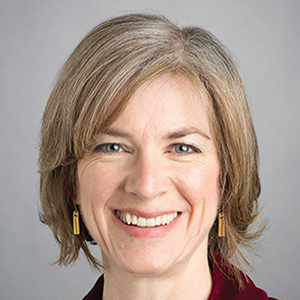Doudna wins Priestley Medal
Jennifer Doudna has been awarded the prestigious 2026 Joseph Priestley Medal for her groundbreaking work on RNA molecules with enzymatic functions by the American Chemical Society. This medal is the highest honor given by ACS and recognizes distinguished scientists in chemistry. Specifically, ACS cited her work on ribozyme function, Dicer, double-stranded RNA processing and CRISPR–Cas9 gene editing. Doudna will receive a $20,000 research grant. In 1774, Joseph Priestley, an English scientist and political dissident, discovered oxygen, which answered fundamental questions about combustion and led him to continue his scientific work in America after his political views made it unsafe for him to remain in England.

Doudna is a faculty scientist at the Lawrence Berkely National Laboratory, founder of the Innovative Genomics Institute, a professor at UC Berkeley and an investigator with the Howard Hughes Medical Institute. Her lab investigates RNA as it forms a variety of complex globular structures, some of which function like enzymes or form functional complexes with proteins.
Previous awards include the 2025 National Medal of Technology and Innovation, presented by former President Joe Biden in January for her work on work on CRISPR–Cas9 gene editing, as well as the 2020 Nobel Prize in Chemistry alongside Emmanuelle Charpentier. She is a member of the National Academy of Sciences, the National Academy of Medicine, the National Academy of Inventors and the American Academy of Arts and Sciences. Doudna is also a Foreign Member of the Royal Society and has received numerous other honors, including the Breakthrough Prize in Life Sciences, the Japan Prize, the Kavli Prize, the LUI Che Woo Welfare Betterment Prize and the Wolf Prize in Medicine.
“Jennifer’s career and discoveries have been nothing short of phenomenal,” Michael Marletta, professor of chemistry and molecular and cell biology at the University of California, Berkeley, said in the ACS press release. “She is a national and international leader in science. She is a strong and visible role model for women across the globe. She leads by her devoted mentorship to her students and postdocs. Her leadership in charting a course for the ethical use of gene editing has been essential.”
She will formally accept the award and deliver remarks at the ACS Spring 2026 conference.
Enjoy reading ASBMB Today?
Become a member to receive the print edition four times a year and the digital edition monthly.
Learn moreGet the latest from ASBMB Today
Enter your email address, and we’ll send you a weekly email with recent articles, interviews and more.
Latest in People
People highlights or most popular articles

The timekeepers of proteostasis
Learn about the cover of the winter 2026 ASBMB Today issue, illustrated by ASBMB member Megan Mitchem.

Defining JNKs: Targets for drug discovery
Roger Davis will receive the Bert and Natalie Vallee Award in Biomedical Science at the ASBMB Annual Meeting, March 7–10, just outside of Washington, D.C.

Building better tools to decipher the lipidome
Chemical engineer–turned–biophysicist Matthew Mitsche uses curiosity, coding and creativity to tackle lipid biology, uncovering PNPLA3’s role in fatty liver disease and advancing mass spectrometry tools for studying complex lipid systems.

Summer research spotlight
The 2025 Undergraduate Research Award recipients share results and insights from their lab experiences.

Pappu wins Provost Research Excellence Award
He was recognized by Washington University for his exemplary research on intrinsically disordered proteins.

In memoriam: Rodney E. Harrington
He helped clarify how chromatin’s physical properties and DNA structure shift during interactions with proteins that control gene expression and was an ASBMB member for 43 years.

